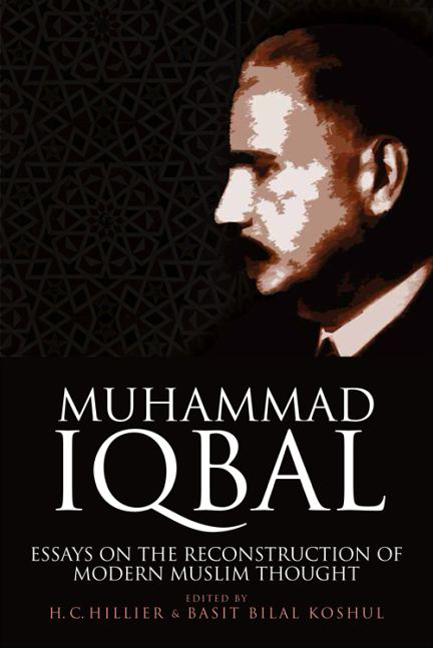Book contents
- Frontmatter
- Contents
- Preface
- 1 Introduction
- 2 The Human Person in Iqbal's Thought
- 3 Achieving Humanity: Convergence between Henri Bergson and Muhammad Iqbal
- 4 The Contemporary Relevance of Muhammad Iqbal
- 5 Pragmatism and Islam in Peirce and Iqbal: The Metaphysics of Emergent Mind
- 6 Between Hegel and Rumi: Iqbal's Contrapuntal Encounters with the Islamic Philosophical Traditions
- 7 Reconstructing Islam in a Post-metaphysical Age: Muhammad Iqbal's Interpretation of Immortality
- 8 Iqbal, Bergson and the Reconstruction of the Divine Nexus in Political Thought
- 9 Muhammad Iqbal: Restoring Muslim Dignity through Poetry, Philosophy and Religious Political Action
- Index
7 - Reconstructing Islam in a Post-metaphysical Age: Muhammad Iqbal's Interpretation of Immortality
Published online by Cambridge University Press: 10 October 2017
- Frontmatter
- Contents
- Preface
- 1 Introduction
- 2 The Human Person in Iqbal's Thought
- 3 Achieving Humanity: Convergence between Henri Bergson and Muhammad Iqbal
- 4 The Contemporary Relevance of Muhammad Iqbal
- 5 Pragmatism and Islam in Peirce and Iqbal: The Metaphysics of Emergent Mind
- 6 Between Hegel and Rumi: Iqbal's Contrapuntal Encounters with the Islamic Philosophical Traditions
- 7 Reconstructing Islam in a Post-metaphysical Age: Muhammad Iqbal's Interpretation of Immortality
- 8 Iqbal, Bergson and the Reconstruction of the Divine Nexus in Political Thought
- 9 Muhammad Iqbal: Restoring Muslim Dignity through Poetry, Philosophy and Religious Political Action
- Index
Summary
According to Muhammad Iqbal (1877–1938), the Indian philosopher and poet, the greatest political problem facing Muslims is the sense of disenchantment or loss of meaning that accompanies the spread of modern thought. For Iqbal, one of the greatest modern poets in the Urdu and Persian languages, and also the spiritual father of Pakistan, modern science and philosophy have made it difficult to believe in Islam. In particular, the traditional understanding of an immortal soul destined either for heaven, with its gardens, rivers, and houri, or hell, with its fires and torments, may now appear illusory or mythical. As a consequence, the Islamic teaching about how to approach the meaning of one's mortality is no longer capable of providing either guidance to the individual or a source of shared meaning for the community, despite the persistent need for both. This essay examines Iqbal's response to this challenge. I rely for the most part on his main philosophic work, The Reconstruction of Religious Thought in Islam (2012).
The problem of the meaning of mortality is one that is felt widely. As Iqbal notes, ‘No age has produced so much literature on the question of immortality as our own, and this literature is continually increasing in spite of the victories of modern Materialism’ (2012: 89). As Roxanne Euben (1997a, 1997b, 1999) notes, in response to this challenge many Islamic thinkers have rejected Western rationalism wholesale or attempted to allow for scientific progress, but only within certain sanctioned boundaries. Rather than with- drawing into an obscurantist fundamentalism, however, Iqbal faces these issues directly. His interpretation of immortality is a key part of his effort to provide, on the model of Rumi and Goethe, a new understanding of Islam in light of modern thought. It is not an attempt to refute modern science, nor is it part of an attempt to reject modern individualism or the modern state, but to show the continuity of these modern developments with the trajectory of previous Muslim thought as well as to open a path for the future progress of religion.
- Type
- Chapter
- Information
- Muhammad IqbalEssays on the Reconstruction of Modern Muslim Thought, pp. 142 - 166Publisher: Edinburgh University PressPrint publication year: 2015



